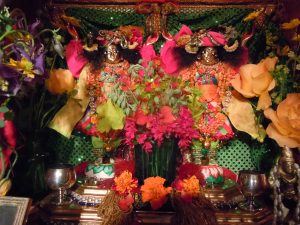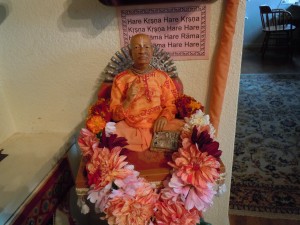I shall be happy in 4 different ways-wanting to become something
Prabhupāda: Not supreme. He says this is of the person, different ways of thinking. But everywhere He is stressing bhakti. Just like generally people are karmī. Karmīs. They are working hard. And he has made his plan. He has made his plan that, “In this way, I shall be happy.” So throughout the whole world, the beginning from animals, lower than the man, and then men, different types of men… So manaḥ ṣaṣṭhānīndriyāṇi, every one of them, he is planning or he is thinking in different ways. So the animals, they cannot understand the master’s answer. But in the human being, they are according to the mind, mental concoction and planning, there are four classes of men. One class is called karmī. They are thinking that by working hard and trying to find out my own way of happiness, they will be happy. This is called karmī. Without any knowledge, they are simply working. They are actually like the animals. The animals, the dog, is jumping, a few miles he is jumping. He is thinking that “By jumping I shall be happy.” Or for the time being he may happy by jumping. And sometimes thinking otherwise. So karmīs, they do not know what is the actual aim of life. Out of many millions of persons, mostly they are karmīs. They do not know what is the actual aim of life. But they are devising different plans, that I shall be happy in this way.” This is called karmī. He does not take the standard way of happiness. Then the next elevated person is jñānī. He thinks, ponders, that “I have worked so hard, but still I could not become happy.” The jñānī. He searches out philosophically. Then next class, yogi. Yogi concentrates the mind to think over, “What is my problem? Why I am not happy? How he can become happy?” He is trying to, very soberly, to understand. Yoga means controlling the senses, and the master of the senses is the mind. So he, trying to make the mind concentrated on the fact, he is yogi. And then the next stage is… If he is yogi, then there are different types of yoga system. But when he comes to the point that “I am not master. There is one master, controller. So master, whatever master orders, I have to execute that. That is my real happiness.” Bhakta. So karmī, jñānī, yogi, and bhakta. So out of these four classes of men, the three classes means karmī, jñānī and yogi, they are restless. Because they actually did not find out what is the solution. One after another, there are different classes, there are classification. One is better than the other. That is another thing. But none of them… They are still misled.A karmī, he is thinking that “I am poor man. If I become rich man, I will be happy.” He is thinking in that way. Jñānī is thinking that “Poor and rich doesn’t matter. I am Brahman. I am spirit soul. If I merge into the Supreme Brahman I will be happy.” Yogi is thinking that “The Absolute is present everywhere in His personal feature. Īśvaraḥ sarva-bhūtānāṁ hṛd-deśe arjuna tiṣṭhati [Bg. 18.61]. So if I become one with Him, I will be happy.” But still there is a demand, “If I become like this.”So so long he is not self-realized, he will try to become something and so long he’ll try to become something, then there will be restlessness. There cannot be happiness. And when he comes to the realization point that “Why I am trying to become something, I am this and this that is my position,” then he becomes happy. That is bhakti. Everyone is trying to become something. And bhakta knows “I am this.” There is no question of becoming. And this is my position. Very nice. Therefore Kṛṣṇa ultimately said that “This is the most confidential knowledge, Arjuna. I am teaching you so many things. There is no need of understanding so many things. The real thing is that I am the master, you are My servant. You surrender unto Me, that’s all. Then you’ll be happy.”
Indian man: Very bold step.
Prabhupāda: There is no second answer. The answer is one. “Kṛṣṇa is master, I am servant.” That’s all. What is the duty? Just like here is a servant. Whatever you are ordering, he is doing.
Indian man: The same answer is given to jñānī, yogi?
Prabhupāda: Yes.
Indian man: They can understand the same way? They have to come up to bhakta.
Prabhupāda: No, not same way. Because he is dull. Still wanting to become something. He is dull. There is no question of becoming. Just like they say ahaṁ brahmāsmi. You are already Brahman. But on account of your dullness of brain, you are thinking that “I am becoming Brahman.” You are already Brahman. You are already Brahman. Because, if he is part and parcel of Kṛṣṇa, Kṛṣṇa is Parabrahman. So Parabrahman part and parcel must be Brahman. How it can be otherwise? It is a question of, so long one does not understand that he is Brahman, he is trying to become Brahman.
Indian man: Due to ignorance.
Prabhupāda: Due to ignorance. So so long one wants to become Brahman, he is ignorant.
Indian man: Knowledge is futile? Knowledge, it becomes futile then.
Prabhupāda: Yes, because trying to become. There is no question of becoming.
Indian man: To be innocent, to be ignorant is good then.
Prabhupāda: No. Therefore he should go to the master. Because he is ignorant, he must go to the master. Tad vijñānārthaṁ sa gurum eva abhigacchet [MU 1.2.12]. But if you capture one, another person as master who is like me, then you are failure. Therefore we should accept the recognized master by everyone. Just like Kṛṣṇa. Kṛṣṇa is accepted as the master. Beginning from all sources. Vyāsadeva. Vyāsadeva is the original guru. So what Vyāsadeva has said about Kṛṣṇa. Then Vyāsadeva, later on Nārada Muni. And from Nārada Muni, Vyāsadeva. And from Vyāsadeva, Śukadeva Gosvāmī. And Śukadeva Gosvāmī is describing about Kṛṣṇa. Then paramparā, from Śukadeva Gosvāmī, others, Sūta Gosvāmī, like that. The knowledge is the same. Kṛṣṇa says that “I spoke about this knowledge to the sun-god. And he explained this knowledge to Manu.” So in this way, apart from that, that I have not seen Manu I do not know. But when there is Bhagavad-gītā, Kṛṣṇa said to Arjuna, “That’s a fact.” So you understand from Arjuna what Arjuna said. Why should you go to somebody else? That is written record, how Arjuna understood. That is the way. Why should we go to a person who does not know? One who knows, we should go. Yes. This is a fact, that Arjuna understood it.
Indian man: How to seek a master? How to find a master?
Prabhupāda: If you do not know how to seek a master, then how you can quote your so-called rascal master? If you do not know the way.
Indian man: Because there are so many fake masters.
Prabhupāda: So why you should go to that fake master? If you do not know what is…
Indian man: They prophesize, they call, they invite. The ignorant people go, they don’t know what real master is. So they come…
Prabhupāda: That much intelligence, we must have that intelligence, that who is master. Suppose if you want gold, if you do not know where gold can be purchased, then he is cheated.
Indian man: That is what is happening.
Prabhupāda: Yes. So why should you be cheated? At least you go to a shop where gold is purchased and sold. Why should you go to a pan wala. If you have no such knowledge then you will get. You must know at least that gold has to be purchased from a merchant who is dealing in gold. If you do not know that, then you will be cheated.
Some Conclusions-Srila Prabhupada begins by saying the 4 different types of people who are trying to become happy by pointing out their mentality.This mentality is all basically cheating mentality because we all want something from somebody., But the Bhakta does not want anything-but to serve the Supreme. He alone is peaceful. Then the question arose in this conversations about how to find a master that can guide you. Prabhupadas answers are still very pertinent today and on into the future.
BG 10.10 purport…When a person knows the goal of life but is addicted to the fruits of activities, he is acting in karma-yoga. When he knows that the goal is Kṛṣṇa, but he takes pleasure in mental speculations to understand Kṛṣṇa, he is acting in jñāna-yoga. And when he knows the goal and seeks Kṛṣṇa completely in Kṛṣṇa consciousness and devotional service, he is acting in bhakti-yoga, or buddhi-yoga, which is the complete yoga. This complete yoga is the highest perfectional stage of life.
Hare Krsna
damaghosa das





